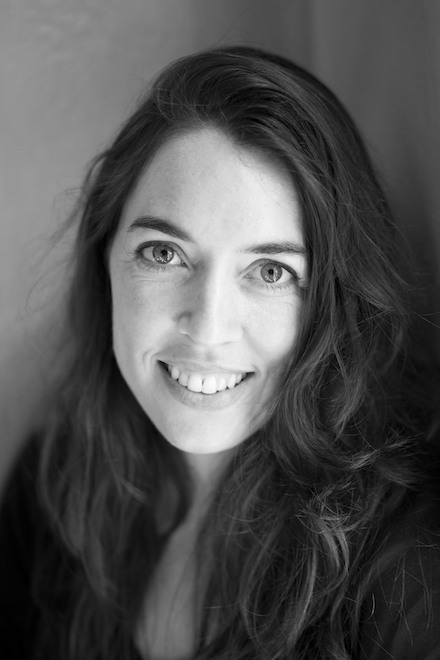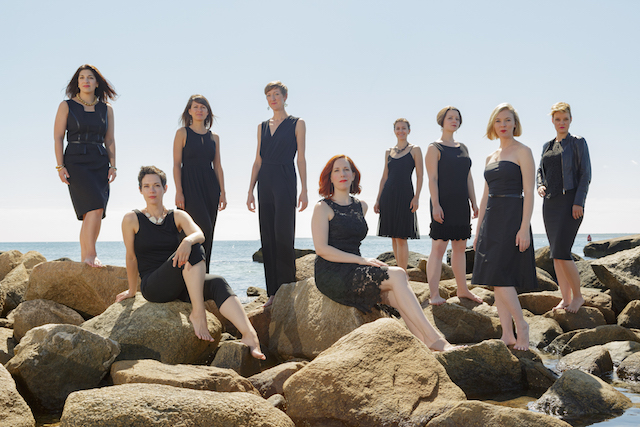(LENOX, Mass.) – The U.S. premiere of Dream of the Song for countertenor, women’s voices – the Lorelei Ensemble – and orchestra, a TMC75 commission by English composer George Benjamin, is a highlight of the 2016 Festival of Contemporary Music at Tanglewood. The piece will be performed in the festival’s concluding concert on Monday, July 25, at 8pm, in Ozawa Hall.
The Festival will also feature two world premieres: Harold Meltzer’s Variations on a Summer Day, and a new TMC commission by American composer Erin Gee for voice, violin, viola, and double bass. In addition, the 2016 FCM will include the U.S. premiere of Joseph Phibbs’s String Quartet No. 1 and the East Coast premiere of Steven Stucky’s Chamber Concerto.
This year’s Festival of Contemporary Music at Tanglewood spotlights composers featured for the first time in the festival’s history, including American composers Sebastian Currier, Erin Gee, Arthur Levering, Harold Meltzer, Joseph Phibbs, and Barbara White, as well as Australian composer Brett Dean, Irish composer Donnacha Dennehy, and Swedish composer Anders Hillborg. In addition, the works by Danish composer Hans Abrahamsen, British composer Jonathan Harvey, Finnish composer Magnus Lindberg, along with those by American composers Donald Crockett, Pierre Jalbert, and Elizabeth Ogonek (TMC Fellow in 2012), will all be new to Tanglewood. There will also be a special focus on such 20th-century giants as Pierre Boulez, Franco Donatoni, Witold Lutos?awski, and Olivier Messiaen.
Widely recognized as one of the nation’s foremost events in the field of new music, the Festival of Contemporary Music, which first took place at Tanglewood in 1964, has presented hundreds of premieres and commissions, performed by Fellows, faculty, and prominent guest artists of the Tanglewood Music Center, the Boston Symphony Orchestra’s acclaimed summer music academy.
In addition to featuring both famous and less-performed works of the most significant composers of the 20th and 21st centuries, the Festival has also introduced music from a wide spectrum of lesser-known composers, representing a wide variety of generations, cultural backgrounds, and compositional styles, and hailing from a multitude of places around the country and across the globe.
FESTIVAL of CONTEMPORARY MUSIC PROGRAM
Thursday, July 21, 8 p.m., Ozawa Hall
The 2016 Festival of Contemporary Music opens on Thursday, July 21 with a program of works for large ensemble, including Witold Lutos?awski’s lively Chain 1 (1983). The program also includes Esa-Pekka Salonen’s Five Images after Sappho for mezzo-soprano and chamber orchestra (1999); Magnus Lindberg’s Marea (1990); and the East Coast premiere of FCM Director Steven Stucky’s Chamber Concerto (2009). This first program of the festival will honor Mr. Stucky’s memory with a special opening work: the composer’s 17 Dialoghi, a work for solo cello performed by TMC faculty member Norman Fischer.
Friday, July 22, 2:30 p.m., Ozawa Hall
Mr. Lutos?awski’s influence was an important presence in the music of Joseph Phibbs, whose String Quartet No. 1 (2014) receives its US premiere on the Friday, July 22 FCM program. Hans Abrahamsen’s String Quartet No. 3; Sebastian Currier’s Deep-Sky Objects for soprano, string quartet, piano, electronics, and video, a cycle of love songs set in the future (2008); and Irish composer Donnacha Dennehy’s One Hundred Goodbyes (Céad Slán) for string quartet and soundtrack (2011) round out the program.
Saturday, July 23, 2:30 p.m., Ozawa Hall
The FCM concert on Saturday, July 23, at 2:30 p.m. features six American composers in works for small chamber ensembles, including the world premiere of a new work for voice, violin, viola, and double bass by Erin Gee, commissioned by the Tanglewood Music Center, and Falling Up (2015), a recent work by 27-year-old Elizabeth Ogonek, who’s just been appointed composer-in-residence with the Chicago Symphony. Donald Crockett will be represented at the Festival by his work Whistling in the Dark (1999). Barbara White’s Learning to See (1999-2002), Pierre Jalbert’s Visual Abstract and Arthur Levering’s Cloches II (1997) will also be featured.
Sunday, July 24, 10 a.m., Ozawa Hall
The FCM program on July 24 includes Harold Meltzer’s Variations on a Summer Day, Swedish composer Anders Hillborg’s Brass Quintet (1998), Brett Dean’s three-movement Sextet (Old Kings in Exile) (2010), inspired by Australian author Arno Geiger’s memoir about his aging father; the late British composer Jonathan Harvey’s Song Offerings (1985); Pierre Boulez’s Dérive 1 (1984); and Franco Donatoni’s Arpège for six instruments (1986).
Monday, July 25, 8 p.m., Ozawa Hall; Prelude Concert at 6 p.m., Ozawa Hall
On Monday, July 25, the Festival of Contemporary Music comes to a close with an 8 p.m. Tanglewood Music Center Orchestra concert featuring the US premiere of George Benjamin’s Dream of the Song for countertenor, women’s voices, and orchestra (2015). Also on the program is a work by Mr. Benjamin’s teacher, Olivier Messiaen’s Turangalîla-symphonie (1948), a large-scale orchestral piece that was commissioned by Serge Koussevitzky and the Boston Symphony Orchestra, and premiered by Leonard Bernstein and the BSO in 1949. The Turangalîla-Symphonie is the central work of a trilogy focused on the myth of Tristan and Isolde. Conductor Stefan Asbury leads both works on this program. Messiaen’s Harawi for soprano and piano, the first part of the Tristan trilogy, is also featured on a prelude concert at 6 p.m. in Ozawa Hall.
Contemporary music has a long and distinguished history at the TMC through its entire 76 years, beginning with the appointment of Aaron Copland and Paul Hindemith to the original Berkshire Music Festival faculty in 1940. The TMC’s first world premiere was Randall Thompson’s Alleluia, commissioned by Koussevitzky for the very first opening exercises. Over the decades hundreds of significant contemporary composers have taught, studied, or had works premiered at the TMC. The Tanglewood Music Center has commissioned hundreds of works and TMC Fellows have given countless premieres, including Benjamin Britten’s Peter Grimes in 1946, a Koussevitzky commission given its American premiere by the TMC; world premieres of Charles Wuorinen’s Chamber Concerto for flute and ten players (1964) and the cantata It Happened Like This (2011); Bruno Maderna’s Giardino Religioso (1972); Lee Hyla’s Pre-Pulse Suspended (1984) and The Triadic Coast (2005); Osvaldo Golijov’s first opera, Ainadamar (2003); Michael Gandolfi’s Impressions from “The Garden of Cosmic Speculation” (2004); Elliott Carter’s Sound Fields and Mad Regales (2008); and Helen Grime’s Clarinet Concerto (2009), to name just a fraction.
Continuing in Aaron Copland and Paul Hindemith’s fostering of young careers, many TMC Fellows have returned as members of the composition faculty, notably the Pulitzer Prize-winning composers John Harbison, Jacob Druckman, William Bolcom, Shulamit Ran, and Charles Wuorinen, as well as Luciano Berio, Augusta Read Thomas, Steve Mackey, Bright Sheng, and Michael Gandolfi. Other distinguished faculty have included Elliott Carter, Roger Sessions, Olly Wilson, and Gunther Schuller. Tanglewood has also been instrumental in introducing European and international music to the United States through the Festival of Contemporary Music and with numerous visiting composers, including Henri Dutilleux, Tan Dun, Betsy Jolas, and George Benjamin. The synergy between the distinguished composers at the TMC and their young counterparts has fostered the careers of such TMC alumni as Leonard Bernstein, Michael Colgrass, Irving Fine, Lukas Foss, Norman Dello Joio, Alberto Ginastera, Osvaldo Golijov, Ned Rorem, David Lang, and Judith Weir.
In addition to the countless world premieres the Tanglewood Music Center has performed over the past 74 years, U.S. premieres have included Harrison Birtwistle’s Down by the Greenwood Side (1971), Peter Maxwell Davies’ Blind Man’s Buff (1973), Witold Lutos?awski’s Prelude & Fugue for 13 solo strings (1977), HK Gruber’s Frankenstein! (1980), Pierre Boulez’s Rituel (1975), the American stage premiere of Elliott Carter’s opera What Next? (2006), and a concert performance of George Benjamin’s opera Written on Skin conducted by the composer (2013). The TMC also presented the first U.S. performances of Mozart’s Idomeneo (in 1947) and Zaïde (in 1955).
Widely recognized as one of the nation’s foremost events in the field of new music, the Festival of Contemporary Music, which first took place at Tanglewood in 1964, has presented hundreds of premieres and commissions, performed by Fellows, faculty, and prominent guest artists of the Tanglewood Music Center, the Boston Symphony Orchestra’s acclaimed summer music academy. In addition to featuring both famous and less-performed works of the most significant composers of the 20th and 21st centuries, the Festival has also introduced music from a wide spectrum of lesser-known composers, representing a wide variety of generations, cultural backgrounds, and compositional styles, and hailing from a multitude of places around the country and across the globe.



